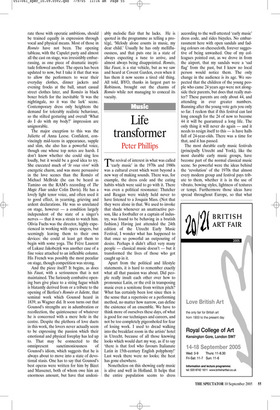Life transformer
Peter Phillips
The revival of interest in what was called ‘early music’ in the 1970s and 1980s was a cultural event which went beyond a new way of making sounds. There was, for example, the dress code and the eating habits which were said to go with it. There was even a political resonance: Thatcher and Reagan were widely held never to have listened to a Josquin Mass. (Not that they were alone in that. We used to invoke that shade whenever an unattractive person, like a footballer or a captain of industry, was found to be behaving in a brutish fashion.) Having just attended the 24th edition of the Utrecht Early Music Festival, I wonder what has happened to that once so powerful an outpouring of desire. Perhaps it didn’t affect very many people — classical music doesn’t — but it transformed the lives of those who got caught up in it.
Apart from the political and lifestyle statements, it is hard to remember exactly what all that passion was about. Did people really insult each other over how to pronounce Latin, or the evil in transposing music even a semitone from written pitch? What has certainly been lost since then is the sense that a repertoire or a performing method, no matter how narrow, can define the existence of an ensemble. We have to think more of ourselves these days, of what is good for our techniques and careers, and not be too completely pigeonholed for fear of losing work. I used to dread walking into the breakfast room in the artists’ hotel in Utrecht, because of all those knowing looks which would dart my way, as if to say ‘there is that fool who favours Italianate Latin in 15th-century English polyphony!’ Last week there were no looks; the heat has gone elsewhere.
Nonetheless on this showing early music is alive and well in Holland. It helps that the entire population seems to dress according to the well-attested ‘early music’ dress code, and rides bicycles. No embarrassment here with open sandals and fading colours on cheesecloth, forever suggestive of being unwashed. One of my colleagues pointed out, as we drove in from the airport, that my sandals were a ‘sad flag’ from the past, but I knew no local person would notice them. The only change in the audience is its age. We suspected that the children of the young people who came 24 years ago were not alongside their parents, but does that really matter? These parents are only about 44, and attending in ever greater numbers. Running after the young vote gets you only so far. I reckon that if this festival can last long enough for the 24 of now to become 44 it will be guaranteed a long life. The only thing it will never do again — and it needs to resign itself to this — is have halls full of 24-year-olds. There was a time for that, and it has passed.
The most durable early music festivals (principally Utrecht and York), like the most durable early music groups, have become part of the normal classical music scene. So powerful were the ideas behind the ‘revolution’ of the 1970s that almost every modern group and festival pays tribute to them, whether it is in the use of vibrato, bowing styles, lightness of textures or tempi. Furthermore those ideas have spread throughout Europe, so that what was once a northern preserve is now a much wider marketplace. And the groups which now descend on Utrecht have the tension of thoroughly professional outfits. No longer the late arrivals in beaten-up vans, the players shambling on to the stage with mumbled apology as if we would all understand. This is early music of a quite different order: encompassing almost the whole gamut of Western music, played to the highest specification by specialists from far and wide.
The ideals behind festivals of this kind these days are demandingly modern. Perhaps it was considered just as modern in 1982 to be laid-back, experimental, a bit fuzzy around the edges for whatever reason, perhaps just plain young; but it won’t do now. The 44-year-olds expect value for money. They pack the hall until the stipulated time for the end of the concert has been reached, and then they get up and leave. If a group overruns, its finale will be accompanied by the sound of scraping chairs. Everyone knows there is another first-class act starting down the road in a few minutes: those who want to be there must run, or get left behind. In fact, it is pressure all the way, for everybody: organisers, artists and audience. Standards are higher, but stumble and you’re a loser. Where have I heard that before?

























































 Previous page
Previous page